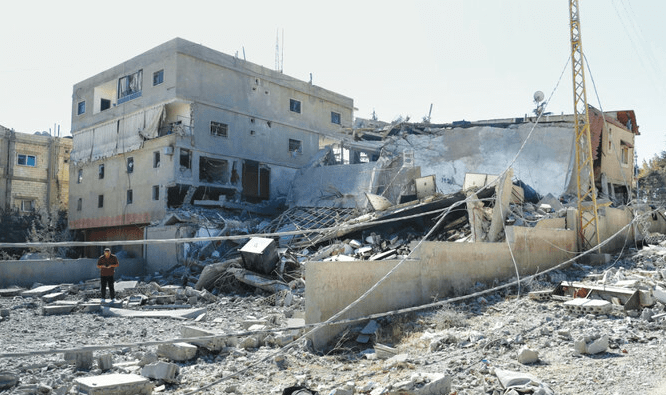Ancient Baalbek is shadowed by war.

Since war erupted between Israel and Hezbollah, the famed Palmyra Hotel in east Lebanon’s Baalbek has been without visitors, but long-time employee Rabih Salika refuses to leave — even as bombs drop nearby.
The hotel, which was built in 1874, once welcomed renowned guests including former French President Charles de Gaulle and American singer Nina Simone.
Overlooking a large archeological complex encompassing the ruins of an ancient Roman town, the Palmyra has kept its doors open through several conflicts and years of economic collapse.
“This hotel hasn’t closed its doors for 150 years,” Salika said, explaining that it welcomed guests at the height of Lebanon’s 1975-1990 civil war and during Israel’s last war with Hezbollah in 2006. The 45-year-old has worked there for more than half his life and says he will not abandon it now.
“I’m very attached to this place,” he said, adding that the hotel’s vast, desolate halls leave “a huge pang in my heart.”
He spends his days dusting decaying furniture and antique mirrors. He clears glass shards from windows shattered by strikes.
Baalbek, known as the “City of the Sun” in ancient times, is home to one of the world’s largest complex of Roman temples — designated a World Heritage Site by UNESCO.
But the latest Israel-Hezbollah war has cast a pall over the eastern city, home to an estimated 250,000 people before the war.
After a year of cross-border clashes with Hezbollah, Israel last month ramped-up strikes on the group’s strongholds, including parts of Baalbek.
Only about 40 percent of Baalbek’s residents remain in the city, local officials say, mainly crammed into the city’s few Sunni-majority districts.
On Oct. 6, Israeli strikes fell hundreds of meters (yards) away from the Roman columns that bring tourists to the city and the Palmyra hotel.
UNESCO told AFP it was “closely following the impact of the ongoing crisis in Lebanon on the cultural heritage sites.”
More than a month into the war, a handful of Baalbek’s shops remain open, albeit for short periods of time.
“The market is almost always closed. It opens for one hour a day, and sometimes not at all,” said Baalbek Mayor Mustafa Al-Shall.
Residents shop for groceries quickly in the morning, rarely venturing out after sundown.
They try “not to linger on the streets fearing an airstrike could hit at any moment,” he said.
Last year, nearly 70,000 tourists and 100,000 Lebanese visited Baalbek. But the city has only attracted five percent of those figures so far this year, the mayor said.
Even before the war, local authorities in Baalbek were struggling to provide public services due to a five-year economic crisis.
Now municipality employees are mainly working to clear the rubble from the streets and provide assistance to shelters housing the displaced.
A Baalbek hospital was put out of service by a recent Israeli strike, leaving only five other facilities still fully functioning, Shall said.
Baalbek resident Hussein Al-Jammal said the war has turned his life upside down.
“The streets were full of life, the citadel was welcoming visitors, restaurants were open, and the markets were crowded,” the 37-year-old social worker said. “Now, there is no one.”
His young children and his wife have fled the fighting, but he said he had a duty to stay behind and help those in need.
“I work in the humanitarian field, I cannot leave, even if everyone leaves,” he said.
Only four homes in his neighborhood are still inhabited, he said, mostly by vulnerable elderly people.
“I pay them a visit every morning to see what they need,” he said, but “it’s hard to be away from your family.”
Rasha Al-Rifai, 45, provides psychological support to women facing gender-based violence.
But in the month since the war began, she has lost contact with many.
“Before the war … we didn’t worry about anything,” said Rifai, who lives with her elderly parents.
“Now everything has changed, we work remotely, we don’t see anyone, most of the people I know have left.”
“In the 2006 war we were displaced several times, it was a very difficult experience, we don’t want this to happen again,” she said. “We will stay here as long as it is bearable.”






